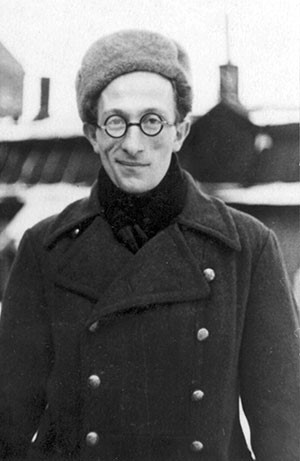The renowned Soviet mathematician, one of the outstanding geometricians of the 20th century, Maks (Max) Akivis was born in 1923 in Novosibirsk, Siberia. In 1929, the family moved to Moscow, where Maks graduated from school and in 1940 enrolled in the faculty of mechanics and mathematics of Moscow State University.
With the beginning of the Soviet-German war, along with other students of his faculty, Akivis was assigned to the construction of fortifications intended to protect Moscow from enemy attack. From July to September he dug anti-tank ditches, which he noted were ineffective since, in the fall of 1941, the Germans bypassed them and threatened Moscow. In October 1941, the University was evacuated to Central Asia. In March 1942, Akivis was drafted into the Red Army and attached to an anti-tank battery of the 664th Rifle Regiment, which was being formed in Central Asia. In the spring and summer of 1943, the regiment held a defensive position on the Mius River (the so-called Mius Front), in the border area between southern Ukraine and southern Russia. The stalemate on the Mius Front lasted until mid-August 1943, when the Soviets began their counter-offensive and broke the German lines. Akivis took part in the liberation of Taganrog, Mariupol (where he was shell shocked) and other towns along the shores of the Azov and Black Seas. From the Black Sea coast, in the winter of 1943-1944, his division was transferred to Belorussia. Akivis fought there, then in Eastern Prussia (where he was awarded the Order of the Red Star). After that, he was transferred to staff service. Akivis ended the war on the Czech-German border.
At the end of 1945, Akivis was demobilized and resumed his studies at Moscow University. In 1949, at the peak of the "anti-cosmopolitan" campaign, he and other Jewish students (including his fellow student and wife Liusia Goldshtein) were expelled from their fifth year of study at the University. The pretext for their dismissal was the accusation that they had read the "Jewish nationalist" poem "Your Victory" by Margarita Aliger (despite the fact that the poem had been published officially in the Soviet magazine "Znamia" in 1945, and then in a book in 1946). Both Akivis and his wife found themselves not only banned from further pursuing higher education, but also unemployed. Later, via a personal contact, he found a clerical job at a factory in Moscow. In 1951, Akivis and Liusia Goldshtein were permitted to be examined as external students and received their diplomas. However, only in 1956, during the post-Stalin "Thaw", was he allowed to engaged in scientific work. In 1958 Akivis defended his kandidat dissertation and, in 1965, his doctoral thesis. In 1966, he was awarded the rank of professor. From 1960 to 1994, he worked at the Moscow State Institute of Steel and Alloys (now the National University of Science and Technology). Akivis published many scientific works. His fields of expertise included differential geometry, tensor calculus, algebra, and other mathematical disciplines.
In 1994, Akivis emigrated from the USSR and settled in Israel, where he was professor at Beer-Sheva University and at the Machon Lev Jerusalem College of Technology. He died in 2015.







